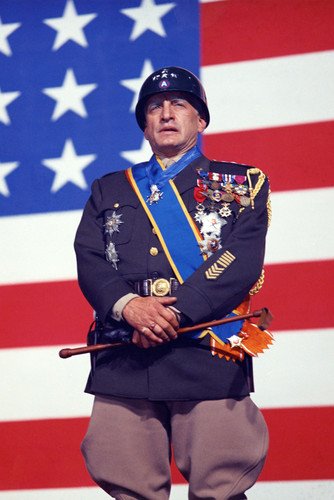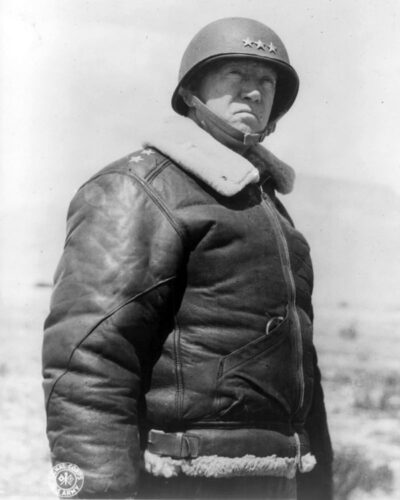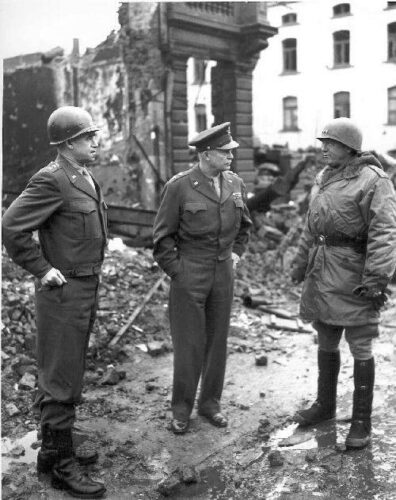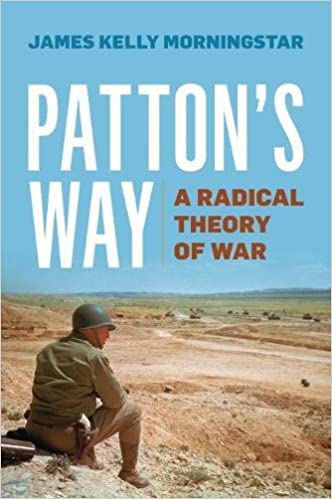George S. Patton is one of America’s most famous generals. His legacy is broad and deep greatly impacting military and popular American culture. That said, common understanding of the man is often limited to George C. Scott’s opening speech in the Oscar Award winning movie “Patton”. The serious student of Patton must put, “Patton’s Way” on his reading list.

There is a plethora of books on General Patton. James Kelly Morningstar’s “Patton’s Way: A Radical Theory of War” differs from many books in that he seeks to correct the common understanding of George S. Patton and does so in a very well referenced and footnoted book.
While there is little new historical material in “Patton’s Way”, the author does an excellent job of making a strong case that Patton has not been properly understood as the visionary student and practitioner of war that he was. Nor has he been credited appropriately with the ability to understand, design, train and lead a modern force that did much more than anyone thought possible. A model we still study today to glean insights into mastering that “calculus of war” he spoke of. A model often applied in leadership circles and the corporate world.

Patton is popularly characterized as an aggressive, profane, and sometimes callous leader. Among military professionals, he has often been understood as reckless, rash, and lucky. Eisenhower himself described Patton as a limited field commander, emotional and impetuous. Omar Bradley, Patton’s commander in France later described Patton as indifferent to supply, lacking self-discipline and lucky. Morningstar challenges that record.
Morningstar says; “Patton developed a new calculus of war: fire to enable maneuver; maneuver to create shock; shock to frustrate enemy decision making; frustrate decision making to destroy enemy morale; and destroy morale to collapse the enemy’s will.”
Through nine chapters of “Patton’s Way”, the reader is taken through the evolution of warfare in the early 20th Century, Patton’s personal experiences, deliberate and measured study, and practice to perfect his “calculus of war”. It climaxes with Patton’s breakout of France and counterattack into the Ardennes. Morningstar very convincingly paints Patton as a visionary vs. a brut and uses a plethora of facts, footnotes, and keen insights to make his case.
Numerous times throughout “Patton’s Way”, Morningstar documents that what appeared to be reckless aggression was decisive action based on reconnaissance. Where luck was credited, forethought and planning took advantage of opportunity. Most persuasive are the words and actions of his sometime detractors (e.g. Eisenhower and Bradley) during the battles and campaign contrasted against their later recollections.

Besides being a paradigm changing book, “Patton’s Way” is a smorgasbord of tidbits. I tabbed the book 20 times. Some are Patton’s words, others are from the many giants he studied. Among my favorites were Patton’s effective staff characteristics, the difference between haste and speed and the Stonewall Jackson quote, “The fact you are attacking induces the enemy to believe that you are stronger than he is.”
No book on Patton can avoid his “Blood and Guts” sobriquet. Morningstar shares Patton’s daughter Ruth Ellen recollection of her father’s thoughts after crawling over a WWI French battlefield examining the dead and fighting the impulse to think of their mothers. She shared,”…the only way to survive under such stress was to try to think of soldiers as numbers, not as individuals, and that the sooner the allies won, the sooner the slaughter of innocents would cease. However, no matter what he said, He could never quite do that.”
The final chapters end with his death and legacy. I was taken aback that none of Patton’s peers attended his funeral and stunned by Bradley’s comment that it was better for his personal reputation that he died. The author makes a good case for Patton as underappreciated. The hypocrisy of Eisenhower not being complimentary of Patton’s staff work yet borrowing his notes at the Combined Arms General Staff College or being surprised by Patton’s ability to turn and attack with a Corps in 48 hours at the Battle of the Bulge is not lost on the reader.
Bradley’s contradictions when it comes to Patton are also addressed. One I was not familiar with was Bradley’s blaming Patton for friendly fire deaths caused by an airstrike conducted perpendicular to friendly lines in Sicily. When the same happened to Bradley’s troops in France, he blamed the pilots.
After reading about this and other friction between Bradley and Patton, I view the movie “Patton” very differently. Much of the movie was based on Bradley’s memoir and he also served as a technical consultant on the movie. A movie that has largely cemented the mythical personage of Patton in the public mind.
Two areas of disagreement I have with an otherwise excellent book are the linkage to Cold War era US doctrine and the absence of analysis of a critical historical event. Patton’s style of training, command and fighting is similar to the Army’s Cold War doctrine of Airland Battle. I do not accept the author’s linkage. I remember a lot written at the time centering on how the German’s fought the Russians in WWII. That seemed to be a much greater influence in the development of Airland Battle vs. Patton.
I think the most flagrant example of writer bias is a sin of omission. The Hammelburg Raid is never addressed. This was the ill-conceived attempt to liberate Patton’s son in law from a Nazi prison camp at the end of the war resulting in the complete destruction of the task force given the mission. The lack of analysis of this major event stands in stark contrast to the author’s solid work.
I believe Morningstar is on the right track in understanding Patton like the Germans that fought him in WWII. Rommel said, “…American generals showed themselves to be very advanced in the tactical handling of their forces, although we had to wait until the Patton Army in France to see the most astonishing achievements in mobile warfare”. General Black who fought Patton on Germany’s border said, “Patton was the outstanding tactical genius of WWII.” Field Marshall Von Rundstedt though said it the simplest, “Patton was your best.”
Read “Patton’s Way” and I think you’ll have to agree.
*The views and opinions expressed on this website are solely those of the original authors and contributors. These views and opinions do not necessarily represent those of Spotter Up Magazine, the administrative staff, and/or any/all contributors to this site.


The Hammelburg Raid was mentioned on pages 13, 17, 263 and footnote 74 on page 288. I discussed as one of two of Patton’s error and his most egregious of the war. He tried to execute a feint and a raid simultaneously, something he should have known was impossible and stupid but he let his desire to liberate his son in law overwhelm his judgement.
Thanks you for your thoughtful commentary. I have to take exception about Hammelburg. I make five reference to the raid including this comment early on on page 17: “Patton pressed his frontal attacks towards Metz too long, but his raid on Hammelburg was even more poorly decided and ineptly designed. He tried to combine a stealthy liberation with an essentially incompatible diversion effort.” Otherwise, I truly appreciate your review.
Yes Sir, there’s no doubt you mentioned Hammelburg but considering the great depth you went into to outline the numerous successes Patton had in a 280 page (and very well done) book, you devoted less than half a page to what is Patton’s greatest and often mentioned mistake.
I would have liked to have seen you address Hammelburg as to why “they are exceptions that prove the rule” instead of leaving it to the reader. E.G. explaining why Hammelburg violated Combined Arms, Command and Control and Intelligence etc. would have gone far in demonstrating Patton was not faultless especially when he violated “Patton’s Way”. That would have made a great contrast with his breakthrough in France or counterattack at the Bulge!
As I’ve stated, yours is a great book and a must read for the serious Patton, warfare and/or doctrine student. That said, short of the Bible I don’t know of any perfect book. I hope you take my point in the manner it was intended, positive criticism.